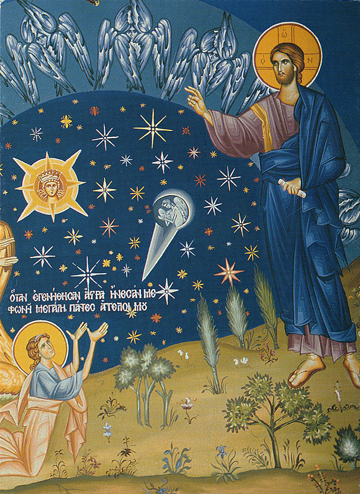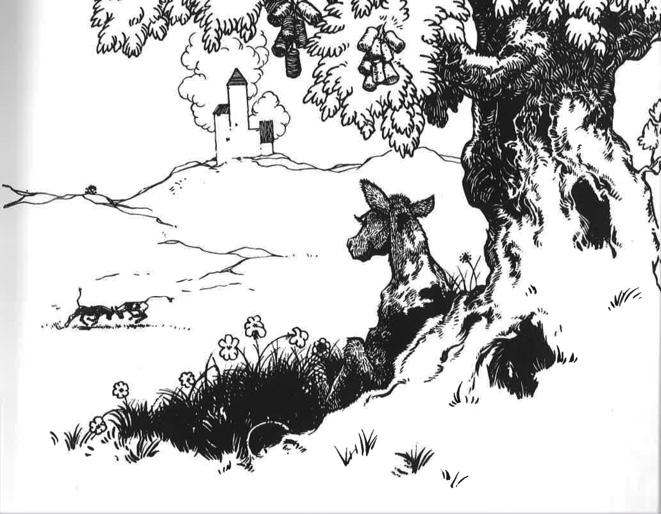2022
The Decay of Words
The Bow and the Club, published by Arktos press in 2018, is a collection of essays written by Julius Evola (1898 - 1974). These essays present a criticism of the modern world from a so-called "Traditionalist" perspective. In one such essay, "The decay of words," Evola considers a number of modern words that are derived from latin, for example: labor, gentle, stipend, and fate. He explains how these words have acquired a very different meaning—and sometimes even a contrary meaning—than their original. Evola aims to show "how important and interesting an enlightened philology would be, since…words have a soul and life, and a return to their origins can often open up surprising perspectives. "
More Wendell Barry
This week in LARGe, lets look at another Wendell Barry essay. This chapter, available as a pdf file here, forms the second to last chapter of his Sex, Economy, Freedom and Community. It is about the relationship between Christianity and our environment.
The Problem with Tobacco

In tobacco country, the choice not to grow tobacco is tantamount to the choice not to farm.
This week, we will be reading an essay written by Wendell Berry in 1991. It is from his book: Sex, Economy, Freedom and Community. The title of the essay is ``The Problem with Tobacco." It is available by clicking here.
Ancient Wisdom and Modern Misconceptions

Fall begins in 2022 on September 22 at 8:04 pm—the moment of the autumnal equinox. Speaking of cosmology, let's plan to discuss Chapter 8 of the book Ancient Wisdom and Modern Misconceptions: A critique of contemporary scientism by physicist Wolfgang Smith. Here is a link to the chapter; it is titled Esoterism and Cosmology: From Ptolemy to Dante to Cusanus. Here, Wolfgang Smith explains what was lost when the traditional geocentric worldview was replaced with the Copernican heliocentric worldview. Here are a few teaser quotes from the chapter:
It is surely no accident that in the wake of the Copernican revolution, religious faith has visibly waned.
One needs to understand that geocentric cosmology is inherently an iconic doctrine.
And perhaps most significantly:
The modern sciences also know nature, but no longer as an icon. They are able to tell us about the size, weight and shape of the icon and even the composition of the various colors of paint used in painting it, but they can tell us nothing of its meaning in reference to a reality beyond itself.
Life!
This week at our Liberal Arts Reading Group, we will continue our discussion of Daniel Toma's Vestige of Eden, Image of Eternity. In Chapter 5, titled ``Life, flat or full? (click to download pdf)", Toma asked the question: What is life?
Moderns have struggled to define life. Things that reproduce? Things that eat and excrete? Things that metabolize? Things that have DNA? There are arguments, and counter-arguments for each of these definitions.
In the middle ages, the scholastics defined living things as those that have an immanent capacity of self-movement with the goal of self-perfection.
Moderns have struggled to define life. Things that reproduce? Things that eat and excrete? Things that metabolize? Things that have DNA? There are arguments, and counter-arguments for each of these definitions.
In the middle ages, the scholastics defined living things as those that have an immanent capacity of self-movement with the goal of self-perfection.
Vestiges of Eden
We have been looking at Daniel Toma's Vestiges of Eden. Here is Chapter 4, which is an Interlude on Reason and Faith.
Ferdinand; and Hemmingway's Faithful Bull

This Friday for our reading group, let’s plan to look at two short stories. The first, Ferdinand, is a children’s story (broken into two pdf files accessible by clicking here: part one and part two). The second is Ernest Hemmingway’s The Faithful Bull; it is a kind of “response” to Ferdinand. They both deal, in their own way, with war and pacifism, societal expectations and individual priorities.
And here is a link to the youtube version of Disney's 1938 Ferdinand movie.
Personalism
Logia, the Journal of Lutheran Theology, has recently accepted for publication an article by our very own Paul Lehninger. The article is The Significance of a Theology of Personalism for Contemporary Confessional Lutheranism. Paul has kindly made a pre-print available to us, so for the next two weeks why don't we discuss this article. That way, if we find any errors, Paul can call the editors quickly and ask them to retract it. :)
In all seriousness, this is a very timely article, as it addresses— from a theological, a philosophical, and a historical perspective—the question of what it means to be a human. This is timely because there is a great deal of debate in our own society about whether human nature (if there in fact -is- a such thing as human nature) is infinitely pliable, or whether it is fixed and immutable.
In all seriousness, this is a very timely article, as it addresses— from a theological, a philosophical, and a historical perspective—the question of what it means to be a human. This is timely because there is a great deal of debate in our own society about whether human nature (if there in fact -is- a such thing as human nature) is infinitely pliable, or whether it is fixed and immutable.
Under Which Lyre
This week's reading selection is the poem Under Which Lyre (A Reactionary Tract for the Times). It was delivered by W.H. Auden at the commencement of Harvard University in 1946, at the close of World War 2. Here is a short analysis of the poem, written by Adam Kirsch for the Harvard Magazine in 2007.
Domingo Gundisalvo
Is there a connection between theology and philosophy? Between grammar and astronomy? If so, what is it? Today, it would not be too much of an exaggeration to say that these disciplines are connected only insofar as they are all taught at schools. This is not how the ancients saw things. In fact, the ancients saw these as an organized and coherent whole. How did they classify and organize the sciences? Two important classifications were written down in the twelfth century: one by Hugh of St. Victor and one by Domingo Gudisalvo.
Let's spend a few weeks looking at a Gundisalvo's 1141 Classification of the Sciences. Gundisalvo's classification was influenced by (his own) recent translation of Arabic texts and commentaries into Latin and Castillian. Here is a pdf file of Gundisalvo's Classification of the Sciences that I photocopied from Grant, E., A Source Book in Medieval Science. Cambridge: Harvard University Press (1974).
Oh, and here is a bio of Gundisalvo from wikipedia: Dominicus Gundissalinus, also known as Domingo Gundisalvi or Gundisalvo (c. 1115 – post 1190), was a philosopher and translator of Arabic to Medieval Latin active in Toledo. Among his translations, Gundissalinus worked on Avicenna's Liber de philosophia prima and De anima, Ibn Gabirol's Fons vitae, and al-Ghazali's Summa theoricae philosophiae, in collaboration with the Jewish philosopher Abraham Ibn Daud and Johannes Hispanus. As a philosopher, Gundissalinus crucially contributed to the Latin assimilation of Arabic philosophy, being the first Latin thinker in receiving and developing doctrines, such as Avicenna's modal ontology or Ibn Gabirol's universal hylomorphism, that would soon be integrated into the thirteenth-century philosophical debate.
Let's spend a few weeks looking at a Gundisalvo's 1141 Classification of the Sciences. Gundisalvo's classification was influenced by (his own) recent translation of Arabic texts and commentaries into Latin and Castillian. Here is a pdf file of Gundisalvo's Classification of the Sciences that I photocopied from Grant, E., A Source Book in Medieval Science. Cambridge: Harvard University Press (1974).
Oh, and here is a bio of Gundisalvo from wikipedia: Dominicus Gundissalinus, also known as Domingo Gundisalvi or Gundisalvo (c. 1115 – post 1190), was a philosopher and translator of Arabic to Medieval Latin active in Toledo. Among his translations, Gundissalinus worked on Avicenna's Liber de philosophia prima and De anima, Ibn Gabirol's Fons vitae, and al-Ghazali's Summa theoricae philosophiae, in collaboration with the Jewish philosopher Abraham Ibn Daud and Johannes Hispanus. As a philosopher, Gundissalinus crucially contributed to the Latin assimilation of Arabic philosophy, being the first Latin thinker in receiving and developing doctrines, such as Avicenna's modal ontology or Ibn Gabirol's universal hylomorphism, that would soon be integrated into the thirteenth-century philosophical debate.